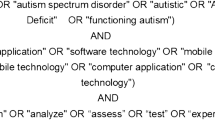Abstract
Empathizing with the software’s future users allows knowledge of their willingness and needs, enabling interfaces more attractive. Similarly, empathizing with autistic users is, above all, understanding their limitations and try to see things and people from their perspective. Despite the importance of the empathizing process, traditional requirements survey methods do not allow this for the autistic audience, mainly for those considered low-functioning. A low-functioning autistic users have a more significant impairment of their skills. Thereby, there is a need for methods that consider their difficulties and support the software requirements elicitation process for autistic users. Therefore, this paper proposes the ACF (Autistic’s Characterization Form), composed of sections representing the four areas of impairment of an autistic person. With the ACF, we provide a set of characteristics representing enough information to support generating empathy between a designer and an autistic person during the requirements gathering phase. We also present a graph called AOG (Autistic’s Overview Graph), which shows the disability rate of the autistic person in each area of limitation of the disorder. Through this work, we intend to support interface designers willing to build empathy during the user interfaces’ requirements elicitation and creation processes.
Access this chapter
Tax calculation will be finalised at checkout
Purchases are for personal use only
Similar content being viewed by others
References
Abdullah, M.H.L., Wilson, C., Brereton, M.: Mycalendar: supporting families to communicate with their child on the autism spectrum. In: Proceedings of the 28th Australian Conference on Computer-Human Interaction, pp. 613–617 (2016)
Alarcon-Licona, S., Loke, L.: Autistic children’s use of technology and media: a fieldwork study. In: Proceedings of the 2017 Conference on Interaction Design and Children, pp. 651–658 (2017)
Alawami, A.H., Perrin, E.C., Sakai, C.: Implementation of M-CHAT screening for autism in primary care in Saudi Arabia. Global Pediatric Health 6, 2333794X19852021 (2019)
Berument, S.K., Rutter, M., Lord, C., Pickles, A., Bailey, A.: Autism screening questionnaire: diagnostic validity. Br. J. Psychiatry 175(5), 444–451 (1999)
Bölte, S., Holtmann, M., Poustka, F.: The social communication questionnaire (SCQ) as a screener for autism spectrum disorders: additional evidence and cross-cultural validity (2008)
Britto, T.C.P., Pizzolato, E.B.: Proposta de guidelines de interfaces com foco em aspectos do autismo. In: Companion Proceedings of the 13th Brazilian Symposium on Human Factors in Computing Systems, pp. 37–40 (2014)
Carlier, S., et al.: Improving autism screening in French-speaking countries: validation of the autism discriminative tool, a teacher-rated questionnaire for clinicians’ use. Res. Autism Spectrum Disorders 61, 33–44 (2019)
Carlier, S., Kurzeja, N., Ducenne, L., Pauwen, N., Leys, C., Delvenne, V.: Differential profiles of four groups of children referred to an autism diagnostic service in belgium: autism-specific hallmarks. J. Intell. Disabil. 22(4), 346–360 (2018)
Chuttur, M.Y.: Overview of the technology acceptance model: origins, developments and future directions. Working Pap. Inf. Syst. 9(37), 9–37 (2009)
Cooper, A., et al.: The inmates are running the asylum: why high-tech products drive us crazy and how to restore the sanity, vol. 2. Sams Indianapolis (2004)
Edition, F., et al.: Diagnostic and statistical manual of mental disorders. Am. Psychiatric Assoc. 21 (2013)
Ferreira, B., Santos, G., Conte, T.: Identifying possible requirements using personas-a qualitative study. In: International Conference on Enterprise Information Systems, vol. 2, pp. 64–75. SCITEPRESS (2017)
Frauenberger, C.: Rethinking autism and technology. Interactions 22(2), 57–59 (2015)
Gong, Y., Yatawatte, H., Poellabauer, C., Schneider, S., Latham, S.: Automatic autism spectrum disorder detection using everyday vocalizations captured by smart devices. In: Proceedings of the 2018 ACM International Conference on Bioinformatics, Computational Biology, and Health Informatics, pp. 465–473 (2018)
Gray, D., Brown, S., Macanufo, J.: Gamestorming: A Playbook for Innovators, Rulebreakers, and Changemakers. O’Reilly Media, Inc., Sebastopol (2010)
Hourcade, J.P., Williams, S.R., Miller, E.A., Huebner, K.E., Liang, L.J.: Evaluation of tablet apps to encourage social interaction in children with autism spectrum disorders. In: Proceedings of the SIGCHI Conference on Human Factors in Computing Systems, pp. 3197–3206 (2013)
Johnson, C.P., Myers, S.M., et al.: Identification and evaluation of children with autism spectrum disorders. Pediatrics 120(5), 1183–1215 (2007)
Marteleto, M.R.F., Pedromônico, M.R.M.: Validity of autism behavior checklist (ABC): preliminary study. Braz. J. Psychiatry 27(4), 295–301 (2005)
Melo, Á.H.D.S., Rivero, L., Santos, J.S.D., Barreto, R.D.S.: Empathyaut: an empathy map for people with autism. In: Proceedings of the 19th Brazilian Symposium on Human Factors in Computing Systems, pp. 1–6 (2020)
Melo, Á.H.D.S., Rivero, L., Santos, J.S.D., Barreto, R.D.S.: Personaut: a personas model for people with autism spectrum disorder. In: XIX Brazilian Symposium on Human Factors in Computing Systems (IHC 2020), 26–30 October 2020, Diamantina, Brazil (2020)
Osterwalder, A., Pigneur, Y.: Business model generation: inovação em modelos de negócios. Alta Books (2020)
Schneidewind, L., Hörold, S., Mayas, C., Krömker, H., Falke, S., Pucklitsch, T.: How personas support requirements engineering. In: 2012 First International Workshop on Usability and Accessibility Focused Requirements Engineering (UsARE), pp. 1–5. IEEE (2012)
Väänänen-Vainio-Mattila, K., Roto, V., Hassenzahl, M.: Towards practical user experience evaluation methods. Meaningful Measures: Valid Useful User Experience Measurement (VUUM), pp. 19–22 (2008)
Acknowledgments
This research was partially funded by the brazilian Coordination for the Improvement of Higher Education Personnel (CAPES). The authors’ thank the Universidade do Estado do Amazonas for their support. The results were published through the research and development activities of the project ACADEMIA STEM, sponsored by Samsung Electronics of Amazonia Ltda., with the support of SUFRAMA under the terms of Federal Law No. 8.387/1991.
Author information
Authors and Affiliations
Corresponding author
Editor information
Editors and Affiliations
Rights and permissions
Copyright information
© 2021 Springer Nature Switzerland AG
About this paper
Cite this paper
Hiléia da Silva Melo, Á., Oran, A.C., Silva dos Santos, J., Rivero, L., da Silva Barreto, R. (2021). ACF: An Autistic Personas’ Characteristics Source to Develop Empathy in Software Development Teams. In: Stephanidis, C., et al. HCI International 2021 - Late Breaking Papers: Cognition, Inclusion, Learning, and Culture. HCII 2021. Lecture Notes in Computer Science(), vol 13096. Springer, Cham. https://doi.org/10.1007/978-3-030-90328-2_14
Download citation
DOI: https://doi.org/10.1007/978-3-030-90328-2_14
Published:
Publisher Name: Springer, Cham
Print ISBN: 978-3-030-90327-5
Online ISBN: 978-3-030-90328-2
eBook Packages: Computer ScienceComputer Science (R0)




